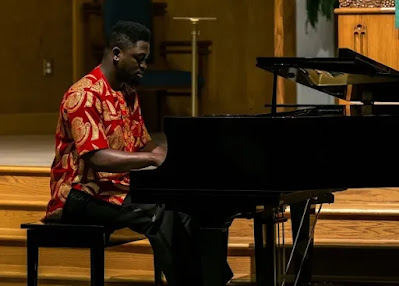If he’s not writing fiction or crafting words into riveting poetry lines, Echezonachukwu Nduka can almost always be seen showing an engrossed audience the magic he does with the grand piano. The pace at which his fingers maneuver piano keys to evoke surreal melody evidences his virtuosity.
The classical pianist has worked with musicians and performed at major concert halls from Europe to America.
His bowtie knot at its tightest sometimes around the collar of his suit shirt; his body draped in traditional Nigerian fabric other times, he treats concertgoers to masterpieces of western composers like Piotr Tchaikovsky and Giacino Rossini just as easily as he percussively pounds the keys to perform the works of many West African composers.
Now hailed as one of the most listened to classical pianists of Nigerian origin, Eche’, as he is fondly called, attended several mission schools as a result of his parents’ vocation as ministers who were transferred to various stations.
An alumnus of the Bishop Crowther Seminary, Awka, he gained admission into the University of Nigeria (UNN) in 2006 to study Music and graduated magna cum laude in 2010. Thereafter, he proceeded to Kingston University London, United Kingdom, where he studied as a postgraduate student in the same field. He has since performed across venues in New Jersey, Missouri, and New York — poised to record solo piano music by African composers.
In this interview with ThaCable Lifestyle, Eche discusses his role in knocking the African tradition into mainstream classical pianism.
Many would ask if there’s really any need to conceptually distinguish between the African approach to pianism and what is obtainable in the global west. In the end, isn’t pianism just pianism?
Of course, it is, if you look at it from a generic perspective. But a closer look would reveal some distinguishing factors which are mostly influenced by diverse cultures. Even in the global west, European classical piano music has the Russian school, German school, Polish school, French school, and the list goes on.
African pianism is the conceptual approach to the ‘School of African Art Music’ just like you have it in the global west, characterized by cultural influences. Of course, the language of music is universal, but this universality does not erase the distinctions which also include diverse performance practices.
One of the reasons why the distinctions are to understand the cultural influences and how it affects performances. It suggests to performers how best to approach pieces. For pieces by African composers, the idea for performers is to make the piano and music to be very percussive like you’re playing drums. For instance, I can’t play works by Christian Anyaeji the same way I would play a Chopin piece. The Chopin piece has its own distinct way of performance to reflect its own tradition. Even the music by Debussy and Ravel.
They have this light touch on the piano; impressionistic compositions that paint a picture. That’s not the same with much African music where you literally have to make the piano sound like drums. It has to be hammered so hard. Understanding these differences will help not just performers but analysts who study and teach it.
Your specialty is Nigerian classical pianism. Why African, given your broader skillset & repertoire?
It speaks to me culturally and I can understand it better. I can study it; I know exactly where it’s coming from. I have more connection to those compositions compared to those of the global west. That is not to say that I don’t play the classical canon. I still play western piano works, even in recitals. My specialization is also to highlight the works of African composers because they’re not mainstream. Classical music is not considered mainstream but, even within that tradition, music by African composers is nowhere near what is considered the classical canon. In other words, they’re almost non-existent.
I feel like, being from this same culture, I would like to give it more attention. I can study western composition and try to follow them the way I was taught but it might not be as convincing because I’m not native to the culture that influenced that music. Also, being a Nigerian and an Igbo man, I feel I should be the one playing this music before it gets the global attention we hope it would. Imagine I’m playing Mozart and, one day, a Chinese pianist pulls up and starts giving workshops about music by Nigerian composers. It would be a shame. We’re on the fringes. I should be at the forefront of those championing this music. The idea is to play African compositions so much so that it encourages them to write more.





No comments:
Post a Comment